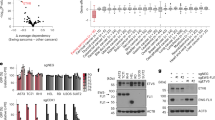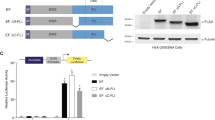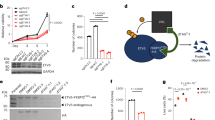Abstract
Ewings sarcoma and primitive neuroectodermal tumors (ES/PNET) are characterized by the fusion of the N-terminus of the EWS gene to the C-terminus of a member of the ETS family of transcription factors. While such fusion proteins are thought to play dominant oncogenic roles, it is unlikely that a single genetic alteration by itself will support cellular transformation. Given that EWS/FLI1 is only able to transform immortalized 3T3 fibroblasts and that 30% of ES/PNET tumors contain a homozygous deletion of the p16 locus, it is likely that other genetic events are required for EWS/FLI1 oncogenesis. Here we describe a complementary mechanism utilized in the establishment ES/PNET tumors. EWS/FLI1 has the capacity to induce apoptosis and growth arrest in normal MEFs. Such effects prevent the establishment of stable expression of the protein in these cells. When expressed in p16, p19ARF, or p53 deficient MEFs, the apoptotic and growth arrest effects are attenuated, creating a environment permissive for stable expression of the protein. While loss of a single tumor suppressor is sufficient to establish expression of EWS/FLI1, cellular transformation requires further genetic perturbation.
This is a preview of subscription content, access via your institution
Access options
Subscribe to this journal
Receive 50 print issues and online access
$259.00 per year
only $5.18 per issue
Buy this article
- Purchase on Springer Link
- Instant access to full article PDF
Prices may be subject to local taxes which are calculated during checkout








Similar content being viewed by others
References
Baker SJ, Preisinger AC, Jessup JM, Paraskeva C, Markowitz S, Wilson JK, Hamilton S, Vogelstein B . 1990 Cancer Res. 50: 7717–7722
Damania B, Mital R, Alwine JC . 1998 Mol. Cell Biol. 18: 1331–1338
Davies R, Hicks R, Crook T, Morris J, Vousden K . 1993 J. Virology 67: 2521–2528
Dyson N, Howly PM, Munger K, Harlow E . 1989 Science 293: 934–937
Esteller M, Tortola S, Toyota M, Capella G, Peinado MA, Baylin SB, Herman JG . 2000 Cancer Res. 60: 129–133
Evan GI, Wyllie AH, Gilbert CS, Littlewood TD, Land H, Brooks M, Water CM, Penn LZ . 1992 Cell 69: 119–128
Fletcher JA . 1998 J. Clin. Oncol. 16: 1241–1242
Funk JO, Waga S, Harry JB, Espling E, Stillman B, Galloway DA . 1997 Genes Dev. 11: 2090–2100
Gjoerup O, Chao H, DeCaprio JA, Roberts TM . 2000 J. Virology 74: 864–874
Gonzalgo ML, Hayashida T, Bender CM, Pao MM, Tsai YC, Gonzales FA, Nguyen HD, Nguyen TT, Jones PA . 1998 Cancer Res. 58: 1245–1252
Hahn WC, Counter CM, Lundberg AS, Beijersbergen RL, Brooks MW, Weinberg RA . 1999 Nature 400: 464–468
Jen J, Powell SM, Papadopoulous N, Smith KJ, Hamilton SR, Vogelstein B, Kinzler KW . 1994 Cancer Res. 54: 5523–5526
Jones DL, Munger K . 1997 J. Virology 71: 2905–2912
Jones DL, Alani RM, Munger K . 1997 Genes Dev. 11: 2101–2111
Kamijo T, Zindy F, Roussel MF, Quelle DE, Downing JR, Ashmun RA, Grosfeld G, Sherr CJ . 1997 Cell 91: 641–659
Kinzler KW, Vogelstein B . 1996 Cell 87: 159–170
Kiyono T, Foster SA, Koop J, McDougall JK, Galloway DA, Klingelhutz AJ . 1998 Nature 396: 84–88
Kovar H . 1998 Curr. Opin. Oncol. 4: 334–342
Kovar H, Jug G, Aryee D, Zoubek A, Ambros P, Graber B, Windhager R, Gadner H . 1997 Oncogene 15: 2225–2232
Land H, Parada LF, Weinberg RA . 1983 Nature 304: 596–602
Lowry DR, Rands E, Scolnick EM . 1978 J. Virology 26: 291–298
May WA, Gishizky MC, Lessnick SL, Lunsford LB, Lewis BC, Delatorre O, Zucman J, Thomas G, Denny CT . 1993 PNAS 90: 5752–5756
Martinez J, Georgeoff I, Levine AJ . 1991 Genes Dev. 5: 151–159
Miller DG . 1980 Cancer 46: 1307–1318
Moens U, Seternes OM, Johansen B, Rekvig OP . 1997 Virus Genes 15: 135–154
Morrison SJ, White PM, Zock C, Anderson DJ . 1999 Cell 96: 737–749
Serrano M, Lee HW, Chin L, Cordon-Carda C, Beach D, DePinho DE . 1996 Cell 85: 27–37
Serrano M, Lin AW, McCurrach ME, Beach D, Lowe SW . 1997 Cell 88: 593–602
Teitell MA, Thompson AD, Sorenson PH, Shimada H, Triche TJ, Denny CT . 1999 Lab. Invest. 79: 1535–1543
Thompson AD, Teitell MA, Arvand A, Denny CT . 1999 Oncogene 18: 5506–5513
Thornberry NA, Lazebnik Y . 1998 Science 281: 1312–1316
Villa P, Kaufmann SH, Earnshaw WC . 1997 Trends Biochem. Sci. 22: 388–393
Wei G, Antonescu CR, deAlva E, Leung D, Huvos AG, Meyers PA, Healey JH, Ladanyi M . 2000 Cancer 89: 793–799
Werness BA, Levine AJ, Howley PM . 1990 Science 248: 76–79
Zalvide J, Stubdol H, DeCaprio JA . 1998 Mol. Cell Biol. 18: 1408–1415
Zindy F, Quelle DE, Roussel MF, Sherr CJ . 1997 Oncogene 15: 203–211
Zindy F, Eischen CM, Randle DH, Kamijo T, Cleveland JC, Sherr CJ, Roussel MF . 1998 Genes Dev. 12: 2424–2433
Zoubek A, Dockhorn-Dworniczak B, Delattre O, Christiansen H, Niggli F, Gatterer Menz I, Smith TL, Jurgens H, Gadner H, Kovar H . 1996 J. Clin. Oncol. 14: 1245–1251
Acknowledgements
The authors would like to thank T Jacks, R DePinho, and M Roussel for providing the MEF cell lines from p53−/−, p16−/− and wild type, and ARF−/− knockout mice, respectively. We would like to thank Steve Hebert for technical assistance in the performing of the mouse tumorigenic assays and Myles Brown for providing the SV40 Large T antigen. We appreciate the thoughtful discussion and critical manuscript review of David Chang, Scott Maul, Mike Teitell, and Scott Welford. This work was funded by a grant from the National Cancer Institute (CA 87771).
Author information
Authors and Affiliations
Corresponding author
Rights and permissions
About this article
Cite this article
Deneen, B., Denny, C. Loss of p16 pathways stabilizes EWS/FLI1 expression and complements EWS/FLI1 mediated transformation. Oncogene 20, 6731–6741 (2001). https://doi.org/10.1038/sj.onc.1204875
Received:
Revised:
Accepted:
Published:
Issue Date:
DOI: https://doi.org/10.1038/sj.onc.1204875
Keywords
This article is cited by
-
The oncogenic fusion protein TAZ::CAMTA1 promotes genomic instability and senescence through hypertranscription
Communications Biology (2023)
-
Somatic chromosomal translocation between Ewsr1 and Fli1 loci leads to dilated cardiomyopathy in a mouse model
Scientific Reports (2015)
-
EWS represses cofilin 1 expression by inducing nuclear retention of cofilin 1 mRNA
Oncogene (2014)
-
Alternate PAX3 and PAX7 C-terminal isoforms in myogenic differentiation and sarcomagenesis
Clinical and Translational Oncology (2011)
-
Recent advances in the molecular pathogenesis of Ewing's sarcoma
Oncogene (2010)



